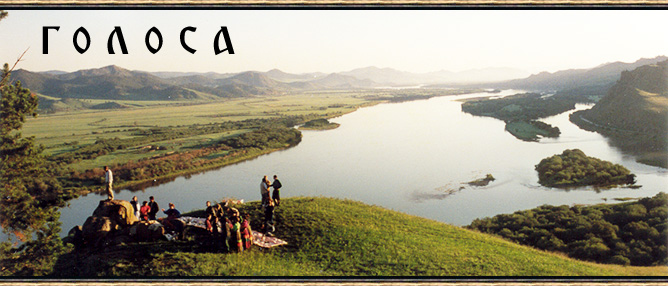A Brief History of Golosá
The history of the Golosá Russian folk choir extends much farther into the past than its founding in the summer of 1997 would imply. The songs as we have them today are descended from songs heard in the earliest of years of the twentieth century in villages throughout Russia; and those songs in turn were merely the latest incarnation of music many years older still.
In 1919, Aleksander Kresling, a German citizen born and raised near St. Petersburg Russia, returned to Freiburg, Germany. With him he brought knowledge of hundreds of Russian folk songs—songs he had learned throughout his childhood—though he had not yet written any of them down. Later, in 1929, he taught some of these songs to a few of his Russian students, and the Russian Choir of Freiburg was born.
In 1996, I traveled to Freiburg to study German, and while I was there there I had the opportunity to sing with this famous choir for one semester. During this time, I not only made many friends but learned a great many songs. I brought them all with me when I moved to Chicago in fall of 1996, but didn’t have anyone to share them with yet.
In the summer of 1997, my friend Loren Shevitz (who knew much more about directing a choir than I did) and I called together some of our musically talented friends, and thus began a new chapter in the history of Kresling’s songs. The group didn’t have a name yet, but eventually became Golosá, Russian for “voices” and also “melodies”.
The next watershed moment in the choir’s history came in 1999, when I traveled with some of my friends from Freiburg to Krems, Austria to meet a Russian singing group called “Sud’binushka”, who were on tour from their distant home village of Tarbagatay in the Siberian province of Buryatia on the shores of Lake Baikal.
The music of Sud’binushka changed my life. The songs were at once alien and immediately accessible—harshly dissonant, and yet heartbreakingly beautiful. I captured everything I could on my field recorder. When I got back to Chicago, I immediately set to work trying to learn some of these new songs and to teach them to the rest of the group.
Eventually, the traditional songs we learned from Sud’binushka became the core of our repertoire. We studied not only the music itself, but also the forward, straight-toned style in which it is sung, and the history and culture of the Semeiskie Old Believers of the Trans-Baikal, who created it.
At the time of writing, Golosá has been lucky enough to travel twice to Siberia to meet and study with Sud’binushka – once in 2001 and again in 2005. And yet, of those of us who participated in those trips only a handful remain in the choir today. We desperately want to return to Siberia to introduce our new singers to the places where these songs were born and to study with the descendants of those Old Believers who brought them thousands of miles across the Siberian wilderness.
Golosá strives to preserve the music and culture of the Siberian Old Believers and of Russian folksinging in general. We dedicate ourselves passionately to singing this music for audiences in the Chicago area and beyond. Since its founding, over 100 members have passed through Golosá’s ranks, and together we have created something which is at once traditional and uniquely our own. We hope that you will have a chance to hear us sing and that you too will become enamored of this music as we have!
–Noel Taylor, founder








